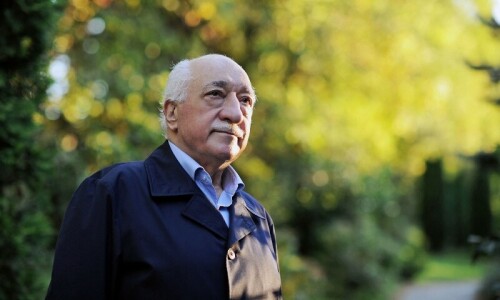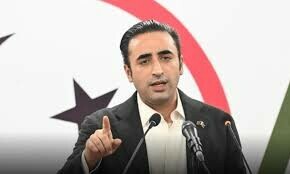
• Kurdish sources claim strikes killed 12 civilians, wounded 25 others
• Erdogan says Ankara attack ‘further strengthens resolve to eliminate terrorism’
ANKARA: The first Ankara attack victims were being buried on Thursday, just hours after Turkiye struck PKK militants in Iraq and Syria whom it blames for the assault on a defence firm that killed five.
As the dust settled after Wednesday’s deadly attack on the state-run Turkish Aerospace Industries (TAI) that also left 22 injured, Turkiye pointed the finger at Kurdish militants as “very likely” responsible.
Turkish investigators said both attackers were “PKK terrorists”, identifying them as a man called Ali Orek, codename “Rojger”, and a woman called Mine Sevjin Alcicek, Interior Minister Ali Yerlikaya wrote on X.
Both appeared in CCTV images posted on X in which they are seen emerging from a taxi then firing assault rifles before entering the building.
The taxi driver, whom they killed, was buried on Thursday at a funeral attended by Yerlikaya and parliamentary speaker Numan Kurtulmus.
Of the 22 people hurt in the attack, eight had been discharged, while the other 14 remained in hospital, Turkiye’s health ministry said.
Security stepped up
Istanbul’s two main airports have since stepped up security, the DHA news agency and private NTV channel reported.
Sabiha Gokcen airport, which is located on the Asian side of the city, told passengers to arrive “at least three hours” early to avoid delays due to increased security.
Overnight, the defence ministry said the military struck “47 terrorist targets” in Syria and northern Iraq and pledged the raids would continue. Kurdish sources in northern Syria said the strikes had killed 12 civilians and wounded 25 others.
President Recep Tayyip Erdogan, who is in Russia attending the BRICS summit of major emerging economy nations, said the attack had “further strengthened Turkiye’s determination and resolve to eliminate terrorism”.
The attack happened amid growing signs of a political thaw between Ankara and Kurdish militants.
Just hours beforehand, PKK leader Abdullah Ocalan — who has been jailed on a Turkish prison island in solitary confinement since 1999 — received his first family visit in years.
Ready to lay down arms?
His nephew, Omer Ocalan, who is a lawmaker for the main pro-Kurdish DEM party, confirmed the visit on X, and said the family had last seen him “on March 3, 2020”. The only other contact was a brief phone call in March 2021.
His uncle was “in good health” and had sent a message about the ongoing “political developments”, saying: “If the conditions allow, I have the necessary theoretical and practical power to shift this process from an arena of conflict and violence to one of law and politics.”
According to Abdulkadir Selvi, a columnist for the Hurriyet daily which is close to the government, during the two-hour meeting “Ocalan said he was ready to lay down his arms”.
On Tuesday, Devlet Bahceli, head of the far-right MHP, which is fiercely hostile to the PKK and belongs to Erdogan’s ruling coalition, sparked shockwaves by inviting Ocalan to parliament to renounce terror and dissolve his movement.
After the attack, DEM — the third largest party in parliament — condemned the violence but said it was “noteworthy” it happened “just as Turkish society was talking about a solution and the possibility of dialogue”.
Arrested on February 15, 1999 in the Kenyan capital Nairobi following a Hollywood-style operation by Turkish security forces after years on the run, Ocalan was brought to Turkiye for trial and sentenced to death.
Published in Dawn, October 25th, 2024














































Dear visitor, the comments section is undergoing an overhaul and will return soon.